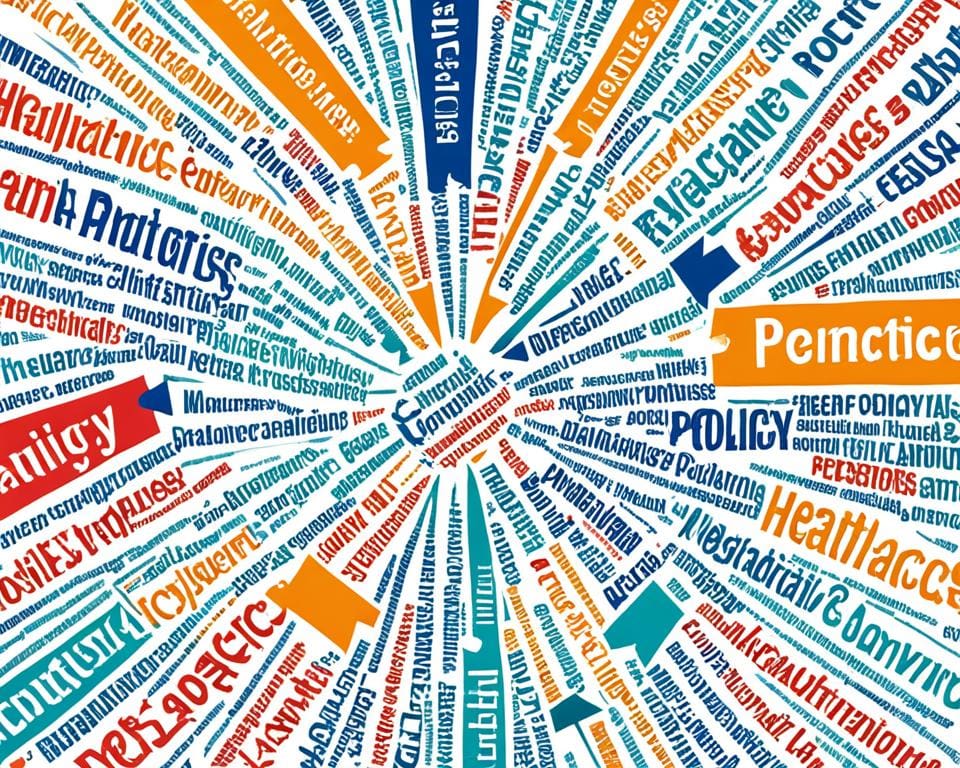In the ever-evolving landscape of the United States, healthcare policy stands out as a critical area of focus that demands our attention. The urgent need for healthcare reform is underscored by rising costs, unequal access to care, and significant disparities in health outcomes across various populations. Understanding the foundational elements of healthcare legislation is essential for navigating the current key issues and debates that impact patients, providers, and policymakers alike.
Recent studies from renowned organizations such as the American Hospital Association, the Centers for Disease Control and Prevention, and the Kaiser Family Foundation highlight the profound significance of healthcare policy analysis in shaping public health and enhancing the quality of care. As we delve into this essential topic, we aim to explore how ongoing debates influence the future of healthcare legislation and its impact on the lives of millions.
Understanding Healthcare Policy Reform
Healthcare policy reform represents a vital area of focus that demands attention and action. Without significant changes, patients face a myriad of challenges that can lead to negative health outcomes. Various studies illustrate a pressing need for reform, particularly highlighting how healthcare system changes influence both availability and quality of care.
The Need for Healthcare Policy Reform
Statistics reveal that millions remain uninsured, highlighting the urgent requirement for healthcare policy reform. High healthcare costs exacerbate this issue, leaving many individuals without access to essential services. The Affordable Care Act has made strides to address these disparities, aiming to enhance access and affordability. Yet, these changes alone have not fully resolved existing gaps in the healthcare system, making ongoing reform efforts essential.
Impact of Policy Reform on Patients and Providers
Proposed healthcare reforms directly affect patient experience and shape provider challenges. For patients, increased access to services can improve health outcomes and create a more equitable healthcare landscape. On the provider side, legislative changes often mean adjusting to new reimbursement structures and navigating increased workloads. Reports from institutions like the Commonwealth Fund emphasize the significance of understanding these dynamics to foster a more effective and responsive healthcare system.

Healthcare Policy: Key Issues and Debates
The landscape of healthcare policy is continuously evolving, marked by significant trends and debates that shape the experiences of millions. By exploring current healthcare policy trends, we can better understand the complexities involved in formulating effective legislation. Key issues such as universal coverage, mental health parity, and drug pricing remain at the forefront of policy debates, influencing how healthcare is accessed and delivered in the United States.
Analysis of Current Healthcare Policy Trends
Current healthcare policy trends reveal a shift towards prioritizing patient-centered care and addressing diverse health disparities. Major players, including advocacy groups and political bodies, actively engage in healthcare policy analysis, aiming to harness public interest and drive reform. The ongoing conversations related to universal healthcare coverage and mental health services showcase the public’s demand for comprehensive solutions and the challenges associated with meeting such needs.
Challenges in Implementing Effective Legislation
Implementing effective healthcare legislation poses notable legislative challenges. Political polarization complicates consensus-building among lawmakers, making it difficult to enact policies that reflect the needs of constituents. Lobbying by pharmaceutical companies adds another layer of complexity, often hindering reforms aimed at lowering drug costs. Public opinion fluctuates on various health reforms, leading to further difficulty in advancing significant changes throughout the legislative process. Understanding these dynamics is essential for navigating the future of healthcare policy.
Healthcare Policy Advocacy and Research
In the realm of healthcare policy, advocacy plays a pivotal role in shaping the landscape of legislation and public health initiatives. Advocacy groups are often at the forefront, using their influence to promote effective policy changes that align with the needs of patients and healthcare providers. These organizations not only raise awareness but also mobilize citizens to demand better healthcare policies.
Influence of Advocacy Groups on Healthcare Legislation
Advocacy groups such as the American Medical Association and the National Patient Advocacy Foundation have become key players in healthcare policy advocacy. Their efforts to lobby for legislation and initiate public awareness campaigns drive meaningful conversations around health policy trends. By leveraging their networks and resources, these groups can effectuate significant changes in healthcare legislation. For instance, the successful push for increased funding for mental health services illustrates the tangible impact such organizations can have on legislative influence.
Current Research Influencing Healthcare Policy
Healthcare policy research provides the necessary evidence base for shaping effective legislation. Current studies focusing on social determinants of health and innovative care models inform decision-makers about the challenges and opportunities within the healthcare system. Reports from esteemed institutions like the Robert Wood Johnson Foundation serve as crucial resources in understanding the dynamics of healthcare policies. Through rigorous research and data analysis, advocacy groups gain insight that strengthens their positions and contributes to informed discussions on health policy trends.
Healthcare Policy Challenges and Impact
The evolving landscape of healthcare policy in the United States presents significant challenges that impact both delivery and efficiency. Chief among these obstacles are insufficient funding, political conflicts, and widespread public skepticism towards policy changes. These healthcare policy challenges not only impede the progress of effective legislation but also hinder the potential for transformative reforms aimed at improving healthcare effectiveness across diverse patient demographics.
Research from esteemed organizations such as the Commonwealth Fund and the National Academy of Medicine illustrates that healthcare legislation barriers often lead to disparities in patient outcomes. Various demographic groups, including low-income families and minority populations, face distinct hurdles that reduce their access to quality care. This disparity emphasizes the importance of targeted policy innovations to address systemic weaknesses and enhance patient engagement.
As we continue to navigate these complex issues, the overall healthcare policy impact must be measured not only in terms of numbers but also in real-world outcomes for patients and providers. By addressing the core challenges identified and prioritizing comprehensive reforms, stakeholders can work together to create a healthcare system that is equitable, effective, and resilient. Embracing collaboration and informed advocacy will be vital in overcoming the existing barriers and advancing the mission of better health for all Americans.









